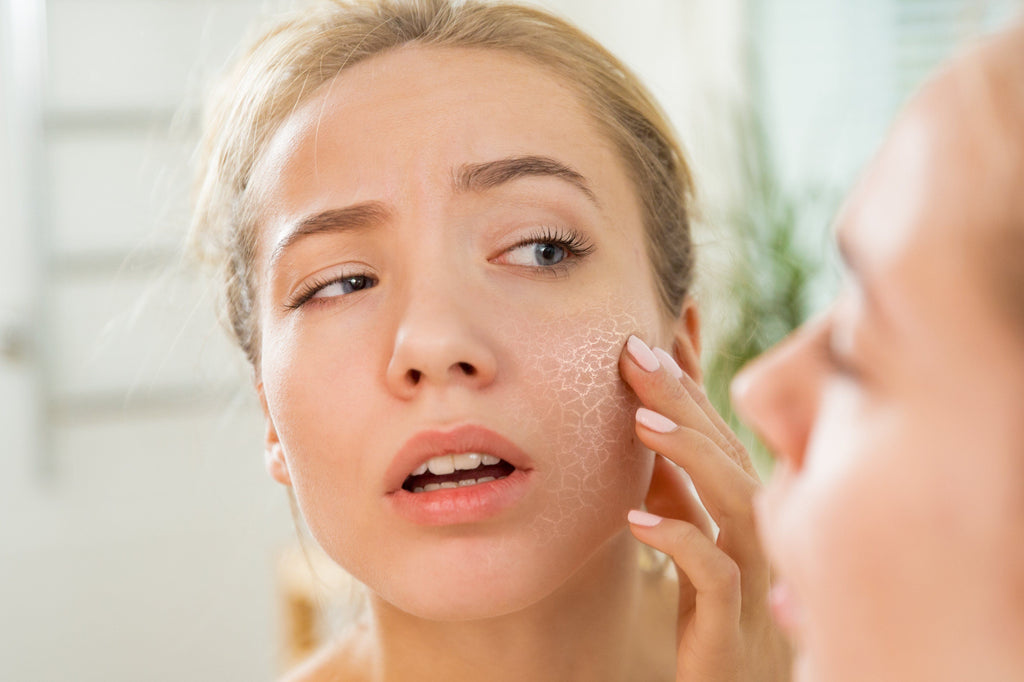
Let’s clarify the main difference between dry and dehydrated skin. It’s important to note that dry skin is a skin type, while dehydrated is a skin condition. Meaning that, if you have dry skin, it is likely something you were born with and will have to address for many years. Dehydrated skin on the other hand, is a temporary condition that can be remedied with some smart and targeted skincare product choices and lifestyle changes. While dry skin lacks oil, dehydrated skin lacks water and hydration. In other words, you can have an oily skin type that is also dehydrated.
So how do you know which category your skin falls under? Here are some ways to find out.
Dry or dehydrated skin? Try the pinch test
Gently squeeze a small area of skin around the cheek. Does your skin wrinkle with the pressure? Or does it bounce back immediately once you let go? If it wrinkles, then this is a good sign your skin is dehydrated.
The hallmarks of dry skin differ from dehydrated skin. Other signs your skin may suffer from dehydration include:
- Dullness
- Dark shadows around the eyes
- Redness or inflammation
- Exaggerated wrinkles
- Skin can feel uncomfortable or tight
How to treat dehydrated skin: Diet and Lifestyle Choices
Oftentimes the reason skin is dehydrated has to do with external aggressors, such as diet, lifestyle and environment. If you’re not drinking enough water, your skin will be dehydrated. The pinch test illustrates just how much your skin cells need water. Make sure you’re drinking 8 glasses of water a day. You can also “eat” your water, which means eating foods that contain a high concentration of water into your diet. Fruits and vegetables, such as cucumbers, watermelon, grapes, strawberries, and melons are some of the best water-rich foods. Wearing SPF and sun-protective clothing will shield your skin from damaging UV rays. Seek shade whenever possible and try your best to avoid the sun during peak hours of 10am -3pm.
The Best Cleanser for Dehydrated Skin
You may not even realize that your cleanser could be to blame for the state of your dehydrated skin. Over-cleansing or using a cleanser that is too harsh can strip the skin of its natural lipids. Lipids, which are the skin’s natural fats, can prevent sun damage and help with moisture retention. If your skin is feeling tight and uncomfortable after cleansing, it’s time to find a way to cleanse that won’t rob the skin of its moisture. A cleansing milk, such as HydroPeptide Cashmere Cleanse, will remove daily impurities without stripping the skin of its natural oils.
The Best Moisturizers for Dehydrated Skin
The main goal in your skincare regimen when dealing with dehydrated skin is to restore moisture loss and support the skin barrier. Fine lines and wrinkles become more pronounced when the skin is dehydrated. You want to incorporate hyaluronic acid into your skincare repertoire, as this star ingredient can hold many more times its weight in water and boosts skin hydration on and below the surface. In the evening, use HydroPeptide Power Luxe which contains special 4-dimensional hyaluronic acid and natural oil combination that act as a humectant by attracting hydration and improving the skin’s lipid barrier. Power Luxe also contains powerful antioxidants to help fight environmental damage that robs the skin of its hydration during the day. In the morning, apply HydroPeptide HydroStem, a deeply hydrating serum rich in protective antioxidants, prior to your sunscreen. Your final step in the morning is sunscreen. Do not leave the house without a broad-spectrum SPF of at least 30 on all exposed areas of skin. Studies show that UV damage decreases water content in the skin. Try HydroPeptide Solar Defense Tinted Sunscreen.
